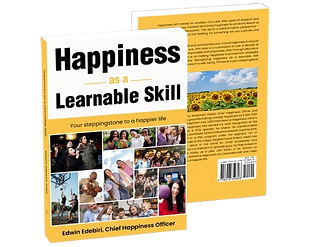As I embarked on this happiness journey, I soon realized that the commonly held belief is that happiness is merely an emotion. After conducting countless interviews, well over a thousand, it became evident that anchoring happiness solely to emotions presents a challenging proposition. When circumstances are favorable, we experience happiness, but when they are not, we plunge into unhappiness. This constant emotional rollercoaster leaves us feeling powerless and devoid of control.
As I meticulously examined the data, a new perspective began to take shape in my mind – there must be an alternative approach that provides us with more agency over our own happiness. This is where the concept of happiness as a skill was born. Happiness, I discovered, is not just an ephemeral feeling; rather, it's a skill that can be cultivated and refined over time. This revelation implies that individuals can actively work on enhancing their happiness by cultivating specific habits, altering thought patterns, and modifying behaviors. Viewing happiness as a skill is both empowering and uplifting. It doesn't guarantee perpetual happiness, but it does mean that you can actively influence it.
As I applied these insights to teach happiness in a variety of settings – from elementary and middle schools to high schools, universities, and corporate boardrooms – I became increasingly convinced that we can take it a step further by emphasizing that happiness is not only a skill but a learnable one. This underscores the idea that anyone, regardless of their initial level of happiness, can acquire the knowledge and techniques necessary to become happier. This realization filled me with enthusiasm and readiness to delve into this subject. It took over a decade to reach this point, and from my experience, I firmly believe that the skills to attain happiness are something that can be imparted and acquired, often through education, self-help resources, or guidance from professionals.
The focus is on making happiness-improvement strategies accessible to everyone, treating it as a skill that can be learned just like any other. Recognizing that happiness is a skill that can be acquired and improved through deliberate practice presents a holistic approach to enhancing one's overall well-being. The purpose of this book is to serve as your steppingstone to a happier life.
The Genesis of It All
One day, following a meditation session, I hopped into my car and headed to one of my cherished places – the Barnes & Noble bookstore in Chico, California. It seemed like a typical day, except for a subtle sense of increased happiness that I couldn't quite pinpoint.
Upon my arrival, I couldn't help but overhear a commotion emanating from the Starbucks nestled within the store. I noticed that everyone was either discreetly engrossed in their own activities or pretending to be. I decided to do the same but found myself inexplicably drawn into the scene. I left my book on a small table I stumbled upon and followed the noise, which led me to a couple engaged in a heated argument that felt more suited for their private living room.
Approaching them, I mustered the courage to ask if they would entertain a quick question. To my astonishment, they halted their quarrel and encouraged me to proceed. In that moment, I was caught off guard, unsure of what to inquire. Out of the blue, I asked, "On a scale of 1 to 10, how happy are you right now?" A hush fell over the Starbucks, and to my surprise, they both offered a numerical response.
I reassured them that their given numbers were not bad at all and excused myself briefly. Returning to my small table, I retrieved a piece of paper and a pen before returning to the couple. I suggested that with a score like the one they provided, there must be something they felt thankful for or happy about. They could jot down one, two, or three such items. Handing them the materials, they each wrote down three items.
To my utter amazement, the most surprising twist occurred when they handed me their lists. They had written down the exact same three things, in the same order. I couldn't contain my excitement and exclaimed that even after being married for over twenty years, I doubted I could accomplish such synchronicity with my spouse, let alone in the same order. They exchanged smiles, and I declared that this was an auspicious beginning. I explained that, despite my lack of knowledge about their circumstances, they could use these three shared items as a foundation for agreement. The entire Starbucks erupted in applause, revealing that everyone had been discreetly watching.
Returning to the couple, I jokingly insisted they owed me something for the risky endeavor I had undertaken. Their surprise quickly shifted to relief as I clarified that I wasn't seeking money; rather, I would be content with a hug from each of them. She embraced me warmly, followed by an even tighter hug from him. I overheard her comment, "Hey, he doesn't hug just anyone," to which I replied that this marked a fresh start for both of them. Wishing them well, I collected my belongings from the table and made my way out of the bookstore.
As I sat in my car, the full weight of what had transpired hit me. It became clear that this encounter might account for the extra happiness I had felt after my earlier meditation. Energized by the experience, I began asking everyone I could spare a few moments with, "On a scale of 1 to 10, how happy are you right now?" I've since applied the life lessons gleaned from my journey all around the world.
Now, it's your opportunity to gain from the insights generously shared with me by these kind individuals, as well as the skills I've honed over the past decade and more.
With much gratitude and happiness,
Edwin Edebiri, MBA
Chief Happiness Officer

